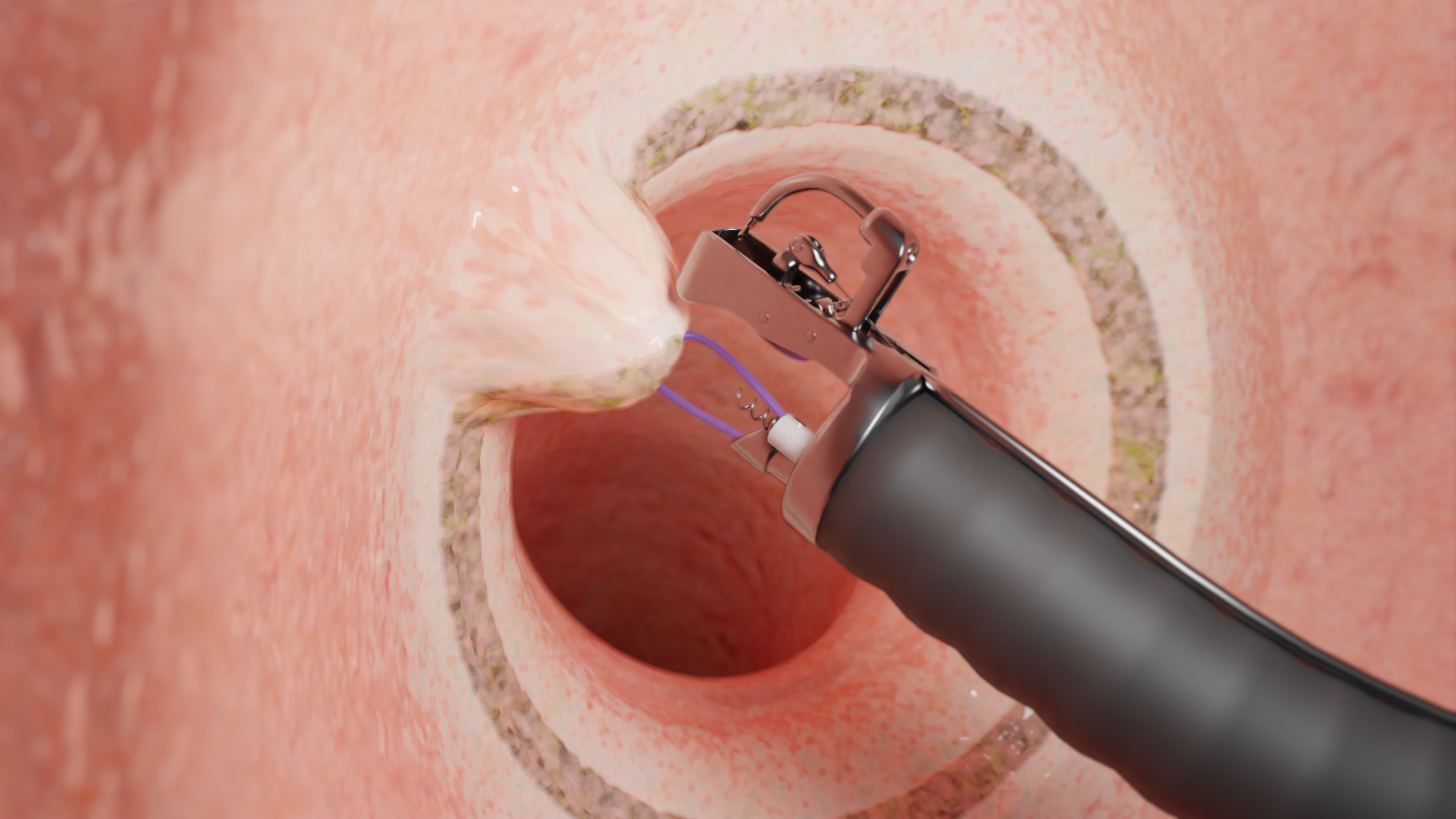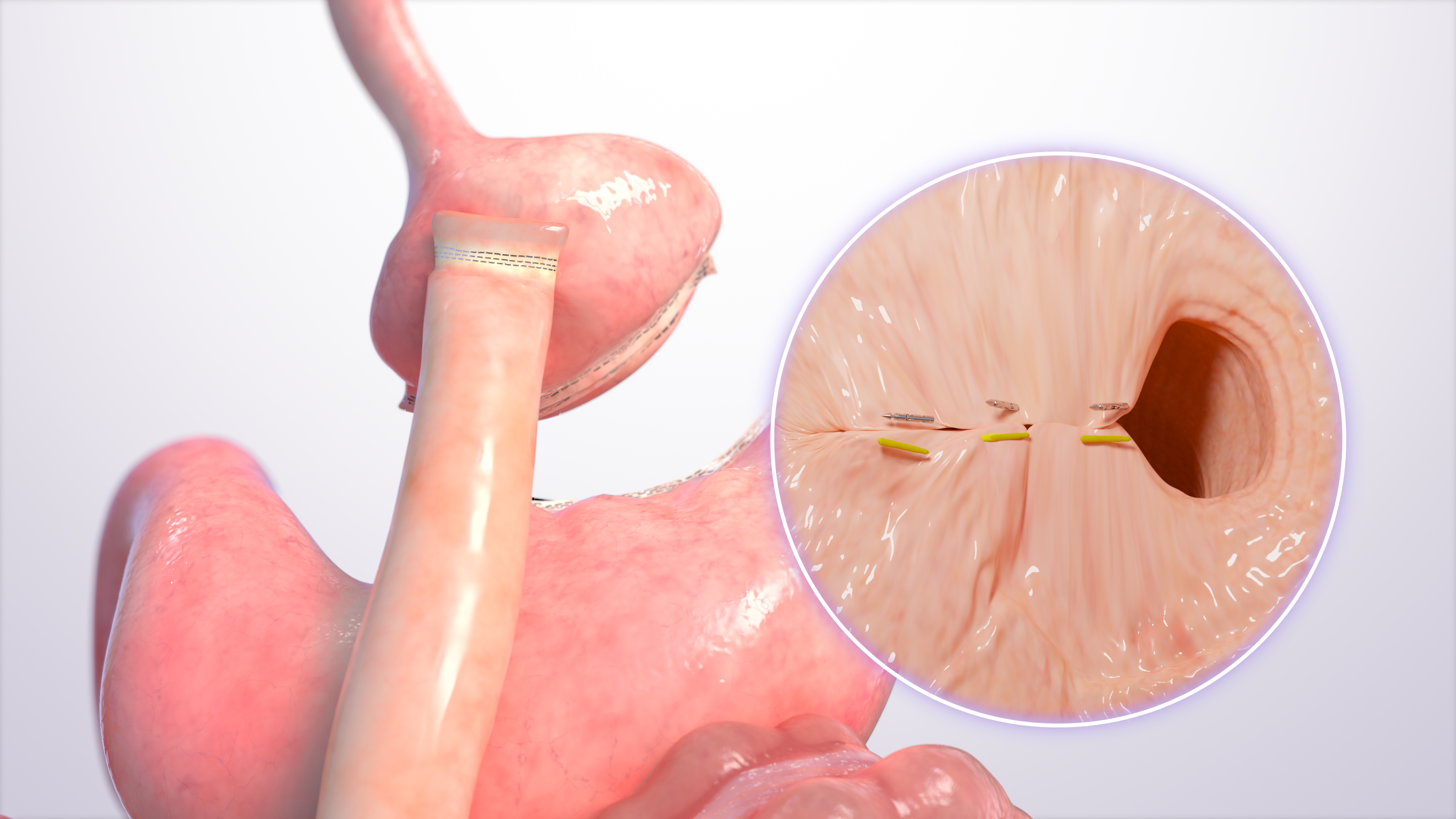Reset and restart
Endoscopic bariatric revision procedures can help patients get back
on track with a successful weight loss journey by addressing anatomic changes
that may cause weight regain.
An estimated 15,000 endoscopic bariatric revisions have been performed worldwide.1
>150 papers and abstracts have been published on transoral outlet reduction (TORe) as a revision to Roux-en-Y gastric bypass.2
Apollo REVISE is the first and only device authorized by the FDA to perform TORe in patients with obesity (BMI 30-50 kg/m2).
1 estimates based on Apollo Endosurgery internal sales data
2 data on file
The TORe procedure
Transoral Outlet Reduction (TORe) is an endoscopic procedure to revise a previous Roux-en-Y gastric bypass.
Under general anesthesia, a gastroenterologist or surgeon uses the FDA-authorized Apollo REVISETM System
to reduce the size of the gastrojejunal outlet.
Watch the video to see how the Apollo REVISETM System and TORe procedure work.

How is TORe performed?
A specially-trained endoscopist uses the Apollo REVISETM System to endoscopically place sutures in an interrupted, running, or circumferential (purse-string) pattern around the gastrojejunal outlet created during gastric bypass. Upon tightening, the endoscopic sutures reduce the size of the outlet back to <10 mm to support weight loss or arrest weight regain. If needed, additional sutures can be placed to reduce the size of the gastric pouch to <2 cm as well.

Clinical evidence
A growing body of clinical evidence supports the safety, effectiveness, and durability of TORe. TORe has the potential for equivalent efficacy and an improved safety profile over laparoscopic approaches.1
-
6%
Total body weight loss (TBWL) at 12 months according to a large meta-analysis2, which exceeds society thresholds for revision procedures.3
-
9-12%
TBWL at 12 months in latest studies using the purse-string approach.4,5
-
Five- and seven-year data confirm safety as well as durable and clinically meaningful weight loss.4,6
-
8.6%
TBWL maintained by TORe patients at 5 years.4
-
8.4%
TBWL for patients followed to 7 years.6
-
zero
SAEs in both studies, evaluating 342 and 443 patients respectively.4,6 In the 5 year data, 11 of 342 patients experienced moderate AEs.
1 Dolan, et al. Gastrointestinal Endoscopy. 2021
2 Jarunvongbanich et al. Gastrointestinal Endoscopy. 2020.
3 Force ABET, et al. Gastrointestinal Endoscopy. 2015.
4 Jirapinyo, et al. Gastrointestinal Endoscopy. 2020.
5 Meyers, et al. Gastrointestinal Endoscopy. 2022.
6 Jirapinyo, et al. Gastrointestinal Endoscopy. 2020. Subset of patients included in study are also represented in 5-year data.
Important Apollo REVISE Safety Information for Healthcare Professionals:
The Apollo REVISETM System is intended to be used by trained gastroenterologists or surgeons that perform bariatric procedures to facilitate weight loss in adult patients with obesity with BMI between 30-50 kg/m2 by enabling transoral outlet reduction as a revision to a previous bariatric procedure.
Contraindications:
These systems are not for use where endoscopic interventions are contraindicated, on malignant tissue, or in patients with large hiatal hernia, potentially bleeding gastric lesions (e.g. ulcers; erosive gastritis; varices; or vascular malformations), affective disorders not under medical supervision or refractory to medical therapy and all eating disorders (e.g. anorexia nervosa; binge eating disorder; specified feeding and eating disorders; avoidant restrictive food intake; rumination), coagulopathy and antiplatelet/anticoagulant therapy that cannot be corrected, or pregnancy.
All patients need to review and understand all the complications and risks before undergoing any procedure. At all times physicians will act as an independent agent and use their independent medical judgement to determine whether any procedure is in the best interest of any particular patient.
Potential risks associated with Apollo REVISE include pharyngitis, vomiting, nausea, moderate abdominal pain, constipation, generalized weakness after procedure, heartburn, fever, gastrointestinal bleeding (with or without melena or hematemesis), dehydration and/or nutritional deficiency requiring hospital admission, perigastric fluid collection, leak, hemoperitoneum, hematoma, paresthesia, GERD, peritonitis, pneumoperitoneum, pulmonary embolism, perforation (gastric or esophageal), pneumothorax, pneumomediastinum, gallbladder suture, spleen laceration deep vein thrombosis, esophageal tear, pleural effusion, persistent vomiting, bowel obstruction, infection/sepsis, bloating, stricture, liver abscess, intra-abdominal (hollow or solid) visceral injury, aspiration, shortness of breath, acute inflammatory tissue reaction, death.
Every practice should review its informed consent practices with respect to endobariatric procedures such as bariatric revision, with their own administration and counsel.
For full safety information, visit apolloendo.com/dfus.
CAUTION: Rx only.
Individual Weight Loss May Vary.

